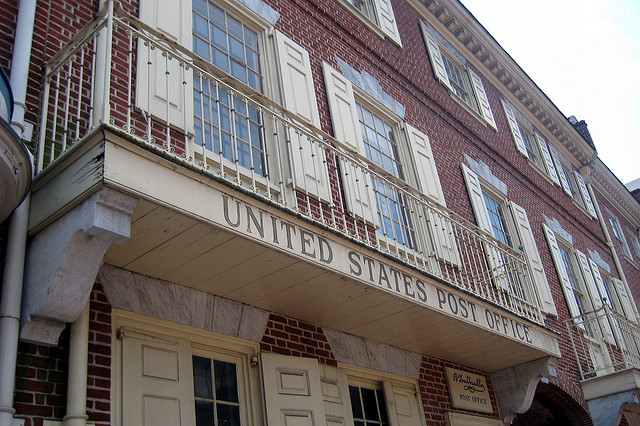
Almost a decade ago, a young man was seeking to collect signatures on a petition. Everywhere he went however–Costco, Wal-Mart, his favorite local mall–managers kicked him out. They told him he was on private property and couldn’t collect signatures there.
Frustrated, he thought, “Why don’t I go to the post office? There are always lots of people waiting in line there, and it’s a public agency. They would have to let me collect signatures there.” So he hopped in his car and drove to his local post office.
And there his troubles began.
The local postmaster came out and told him he had to leave. The guy responded that this was government property and he was just exercising his First Amendment rights to express himself and petition the government. But to his dismay and shock, the Postmaster said that the post office was a business and not part of the government–and was not required to allow him the right to exercise his constitutional rights.
The postmaster said that his petitioning was driving “customers” away and that because of that, and the fact the post office was private property, he had the right to ask the man to leave. And so he did.
But was the postmaster in the right? Or did the postmaster stretch the truth to rid himself of a pesky petitioner?
Unfortunately, it isn’t a simple question to answer. And it’s a relevant one now that the post office faces big deficits and is in need of major reforms. Is it a private business that should be able to heal itself by declaring bankruptcy or raising new capital from investors? Or is it a vital public entity that the government must save?
The post office talks and acts like a private business all the time. It can set postal rates and decide how to charge you for stamps. It can decide when and how to deliver mail, and when and where to build buildings. These are all things that a purely government agency could never do. While politicians often lobby the post office, the post office’s decisions on regulations and procedures are not subject to Congressional approval.
But in other ways, the post office is a quintessential public entity. Private businesses aren’t allowed to be a monopoly–yet the post office is expressly because it is protected from competition. Only the US Postal Service has the full government authority to deliver mail. Yes, giant companies like FedEx, UPS and DHL deliver things–but no company can decide tomorrow that they want to start delivering mail to the citizens of California.
And honestly, who would want to? The postal service has found it more and more difficult to balance its books. Its shareholders would see it as a failing business–if it had shareholders. It doesn’t–because it’s a government agency. The government has bailed out the service in hard times. The postal service’s multi-billion dollar retirement fund is backed and guaranteed by the federal government.
For most of its history, the dual roles of the post office–a private business at times, a public agency in other ways–looked like an advantage. But now that the service is in deep trouble, contemplating the end to Saturday mail service, big layoffs, and other service cuts–the dual nature of the entity is at the root of the problems.
The postal service has no owners who can demand restructuring to save the business. But the public doesn’t fully own it either, because the post office is not fully public. The various proposals to fix the postal service are complicated, contradictory mixes of further privatization–cut them loose from implicit federal support–and direct public bailout, without gaining support. These fixes won’t work because they don’t change the fact that the postal service is an orphan–albeit a giant orphan that is, literally, too big to fail.
If the postal service is to be saved, it must make a choice–and decide to figure out who the owner is. Privatization would be full of perils–can you imagine a post office IPO? Maybe Facebook could buy it. But the more realistic, simpler path is to make it plain that the post office is public property. Which is what the public thinks it is.
Doing that, however, would mean that the postmaster would have to give a different answer to the young man with the petition. When that young man left the post office, he called a group that works on initiative and referendum issues and told his story. In response, a variety of groups across the political spectrum–including the American Civil Liberties Union and the Humane Society of the United States (where I work)–came together to file a federal lawsuit seeking public access to the post office.
It has been a long, frustrating case that has gone on for years, without resolution. Here’s what’s most maddening to me. To defend the proposition that it is a private business, the postal service didn’t hire a private sector law firm. Instead, it received representation from lawyers of the U.S. Department of Justice. That’s right–an entity that claims it is not a public agency is paying for its defense with taxpayer dollars. So, I as a taxpayer am paying to infringe my right to collect signatures on postal property? How crazy is that?
Faced with so many difficulties, the post office would be wise to stop trying to have it both ways–and instead open its doors to anyone who wishes to conduct public business within its doors. Such an opening would revive the post office as a special public space worth saving. It might also bring in some badly needed customers.
Dane Waters, the founder of the Initiative & Referendum Institute, is director of ballot campaigns for the Humane Society of the United States.
*Photo courtesy of wallyg.




Send A Letter To the Editors